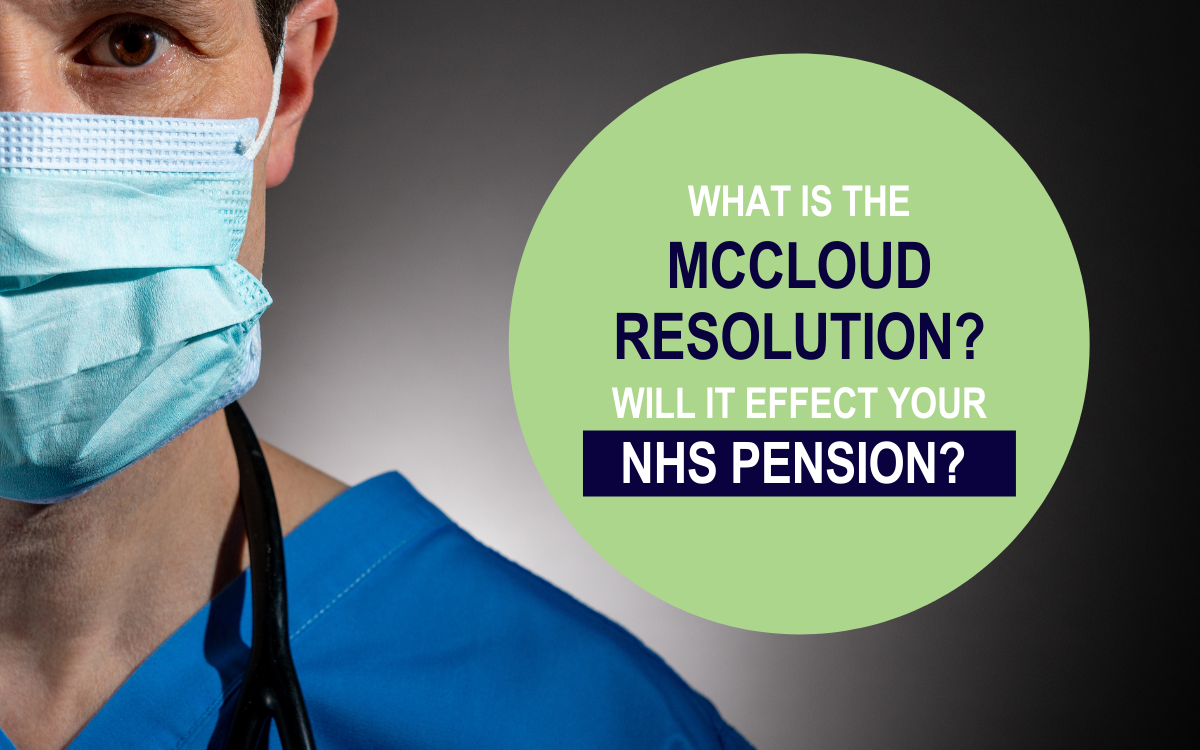
What is the McCloud Resolution and how will it affect my NHS pension?
What is the McCloud Resolution and why should I be interested in it?
The McCloud Resolution (sometimes referred to as the ‘McCloud Remedy’) removes the age discrimination that was judged to have arisen in public service pension schemes, including the NHS Pension Scheme. The discrimination resulted from allowing older members to remain in their legacy (1995 or 2008) scheme rather than being moved to the 2015 Scheme when it was introduced.
The implementation of the 2015 scheme (which included the NHS Pension Scheme and all other public sector schemes), mandated following the Lord Hutton Report, was challenged by a member of the Fire Brigade on the grounds of age discrimination, since members close to retirement were not forced to change to the 2015 scheme, whilst everyone else was. The case went to the high court in London and the member of the Fire Brigade unexpectedly won.
In April 2022, most NHS members were moved from the former 1995 section and the 2008 section pensions to the 2015 section pension
These are the key changes:
- An increase in the Normal Pension Age moved from age 60 under the 1995 section and 65 under the 2008 section to your respective state retirement age under the 2015 scheme.
- The automatic tax-free Lump Sum which was 3 x the annual pension under the 1995 scheme was abolished completely under the 2015 scheme
- Member contributions to the scheme increased by 2.5% per annum for 3 years taking us to where we are today.
The McCloud Resolution came about as a result of the Government launching a consultation group in July 2020 to find solutions that would remedy the age discrimination by providing a resolution to those members affected. The process is scheduled to start in April 2022, at which point each member who was transferred from the 1995/2008 sections will be written to by NHS Pensions.
How are the Lifetime Allowance (LTA) and the Annual Allowance (AA) calculated and should I be concerned about either of them?
The process for both calculations is incredibly complex and particularly for Annual Allowance. However, providing that your Total Rewards Statement (TRS) is accurate, the calculations for the LTA and AA can be done by a specialist financial adviser.
Breaches in respect of the Lifetime Allowance as far as the NHS Pension Scheme (NHSPS) is concerned will result in a 25% tax being applied to the excess. This tax is applied by reducing your annual pension income at retirement and is applied for the rest of your life.
Breaches in respect of the Annual Allowance will result in the excess over the Annual Allowance Threshold being taxed at your marginal rate at the time. The notice of an anticipated breach is usually issued to the member by NHSBSA in October, and if your professional adviser confirms that there is a breach, you must pay the tax by 31st January the following year. Not all anticipated breaches turn out to be actual breaches.
Case Study
I started drawing down on my personal pensions and continued to work but I am now limited by Annual Allowance legislation. Is there any way that I can invest some of my spare income and still get tax relief?
Andrea, 59, is a successful GP and higher rate taxpayer who is a member of the NHS pension scheme. She has started to draw down some of her Personal pensions each year and, at the same time, is also earning a high salary. Since the addition of her pension income, her level of disposable income has increased significantly.
As she is restricted in what she can pay into her pension due to Annual Allowance legislation, she is looking for other tax-efficient options to invest this additional income.
Andrea talks to her financial adviser, who undertakes a detailed assessment of Andrea’s overall objectives, tax position and her aspirations.
In addition to assessing her risk profile, her investment time horizon and her capacity for loss he provides her with advice that results in Andrea being able to invest her disposable income for the future, whilst still being able to claim some tax relief from the Government.
Frequently asked questions about the NHS Pension Scheme
Some more recently heard questions by our Medical accountancy team about the NHSPS are answered below.
What drives the level of Contribution that members pay into the NHS Pension Scheme if you have more than one income stream such as OOHs?
It is the responsibility of the performer (GP) to advise the out of hours (OOH) provider of what their aggregated NHS earnings are from all other sources and as such the correct tiered contribution rate that should be deducted from OOH earnings.
Do your NHS Pension Scheme (NHSPS) contributions affect your actual NHSPS retirement benefits?
No. Your NHS Pension benefits are driven by your pensionable earnings and your years of service only. The contributions that are paid into the scheme today are simply used to pay out benefits to those members who are already retired from the profession and in receipt of their pension benefits. Therefore, it is very important that your pensionable earnings are recorded accurately.
How do I check that my records are accurate?
Your NHS Total Reward Statement (TRS) contains a lot of detailed information for you to assess and can be accessed at https://www.totalrewardstatements.nhs.uk/
What happens to my NHS Pension now that the McCloud remedy has come into effect from 1st April 2022?
Any members of the 1995 or 2008 scheme will now move into the 2015 scheme and this will end final salary accrual and stop career average accrual in either of those schemes for practitioners.
Does this mean that I will lose the benefits that I have built up in the 1995/2008 schemes?
Members who have transferred to the 2015 Career Averaged Revalued Earnings (CARE) scheme from the either of the old schemes will still have their final salary scheme benefits from the 1995/2008 schemes calculated using their pay at retirement (or upon leaving the new scheme) as opposed to being calculated on the date that they leave the old scheme (i.e. 31st March 2022). This is a valuable benefit to those members who were in the old schemes and will increase the value of a member’s final salary benefits even though no further rights are accrued under the old schemes.
PROTECTING YOUR INTERESTS
If you require financial advice to establish how the McCloud Resolution affects your Lifetime Allowance (LTA), Annual Allowance (AA) and related interests, or you have any other questions and queries about your NHS Pension or other financial issues then please contact our friendly team of medical accountants for a no-obligation consultation.
Get in touch if you need help
No Advice: The content produced and presented by Parsons, Chartered Accountants is for general guidance and informational purposes only. It should not be construed as legal, tax, investment, financial or other advice. Furthermore, it should not be considered a recommendation or an offer to sell, or a solicitation of any offer to buy any securities or other form of financial asset. The information provided by Parsons, Chartered Accountants is of a general nature and is not specific for any individual or entity. Appropriate and tailored advice or independent research should be obtained before making any such decisions. Parsons, Chartered Accountants does not accept any liability for any loss or damage which is incurred from you acting or not acting as a result of obtaining ICAEW’s visual or audible content. Information: The content used by Parsons, Chartered Accountants has been obtained from or is based on sources that we believe to be accurate and reliable. Although reasonable care has been taken in gathering the necessary information, we cannot guarantee the accuracy or completeness of any information we publish and we accept no liability for any errors or omissions in material. You should always carry out your own independent verification of facts and data prior to making any investment, legal or tax decisions.







